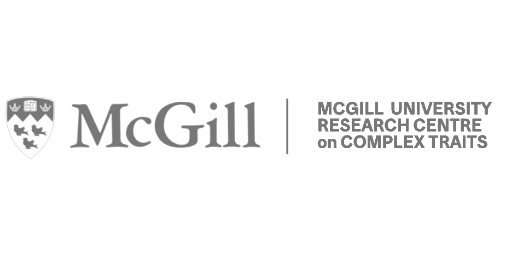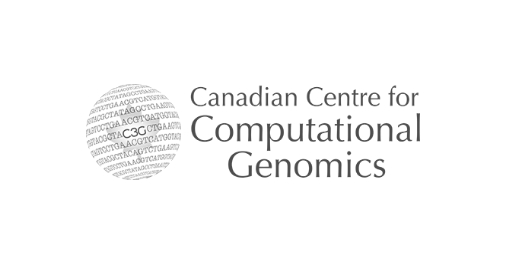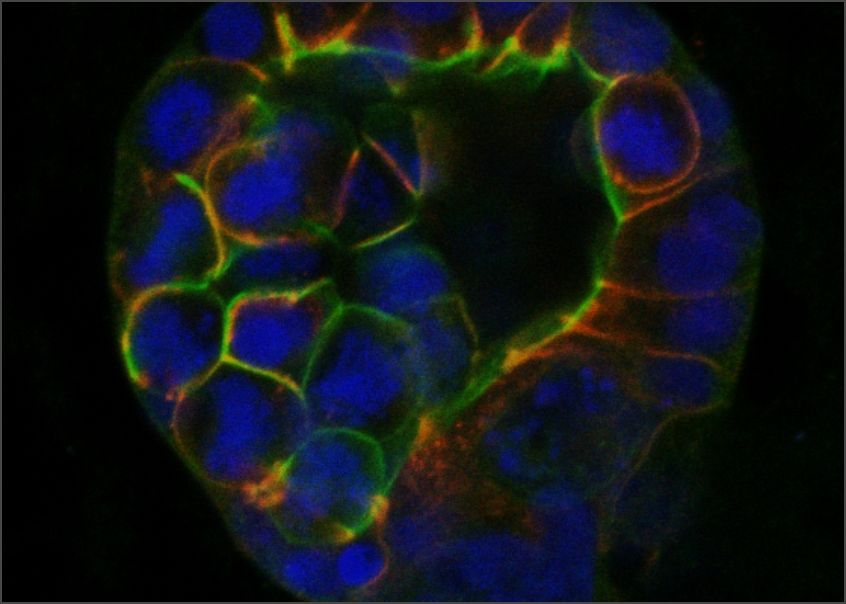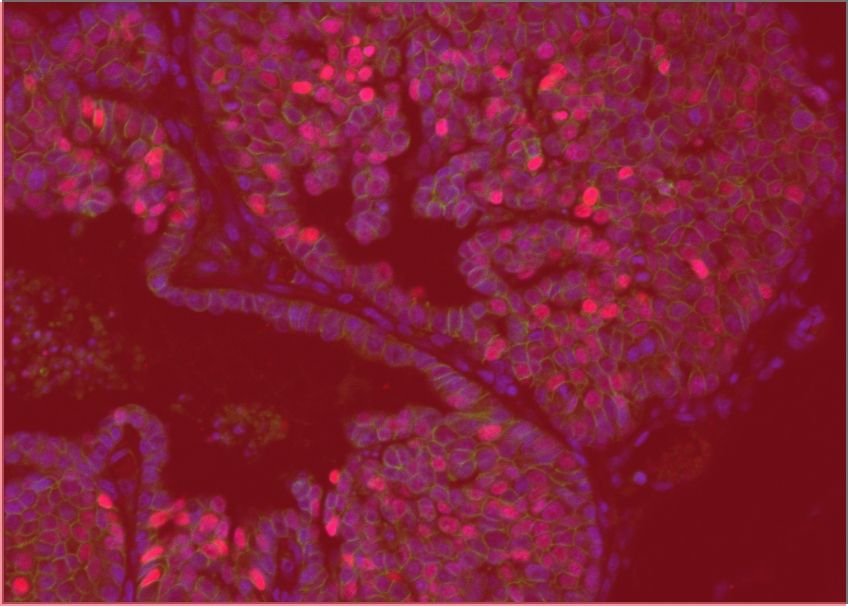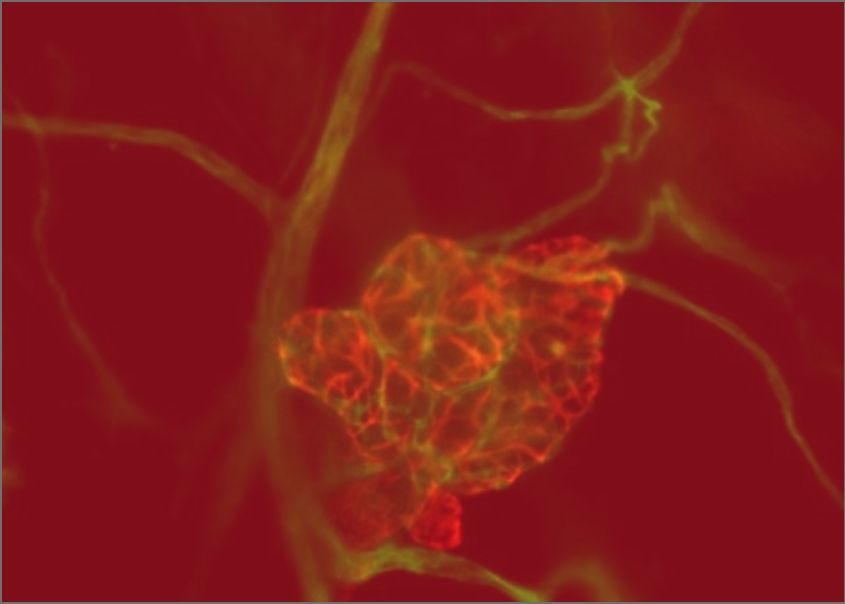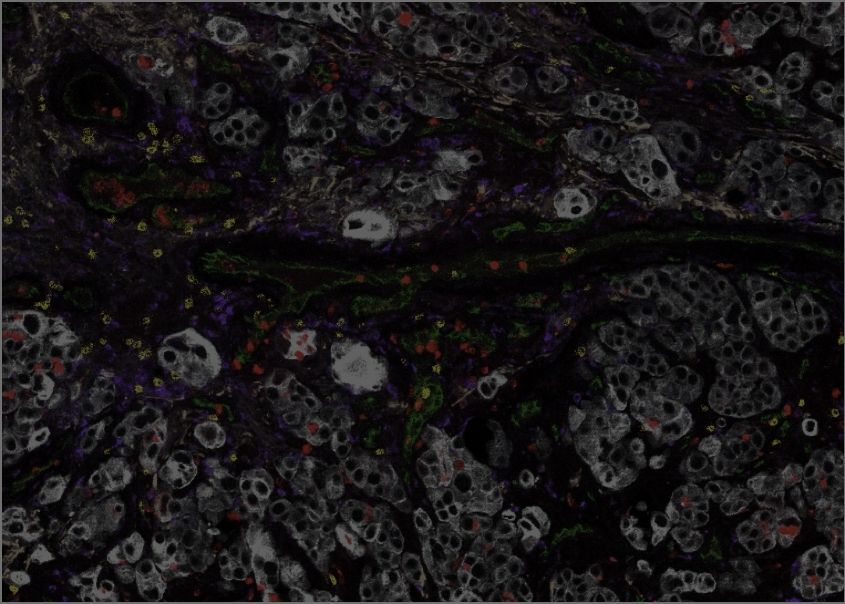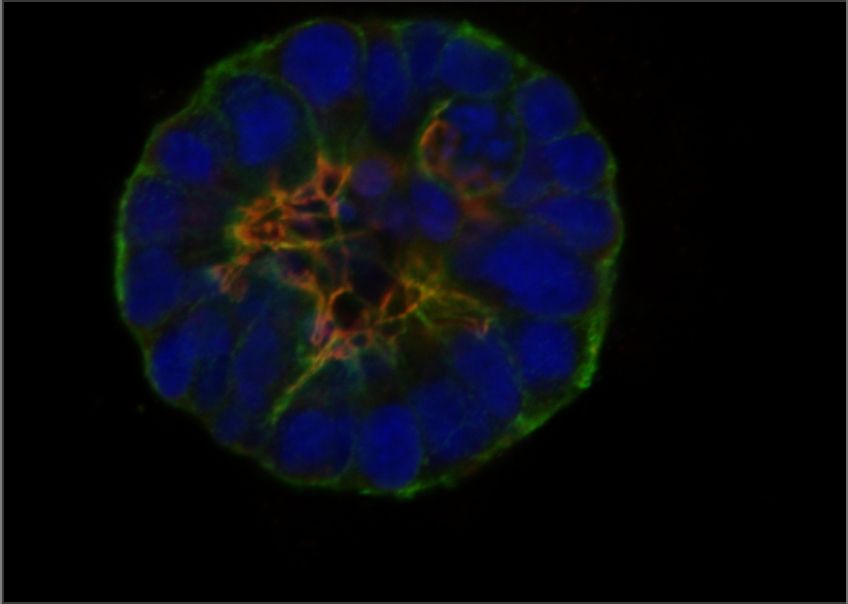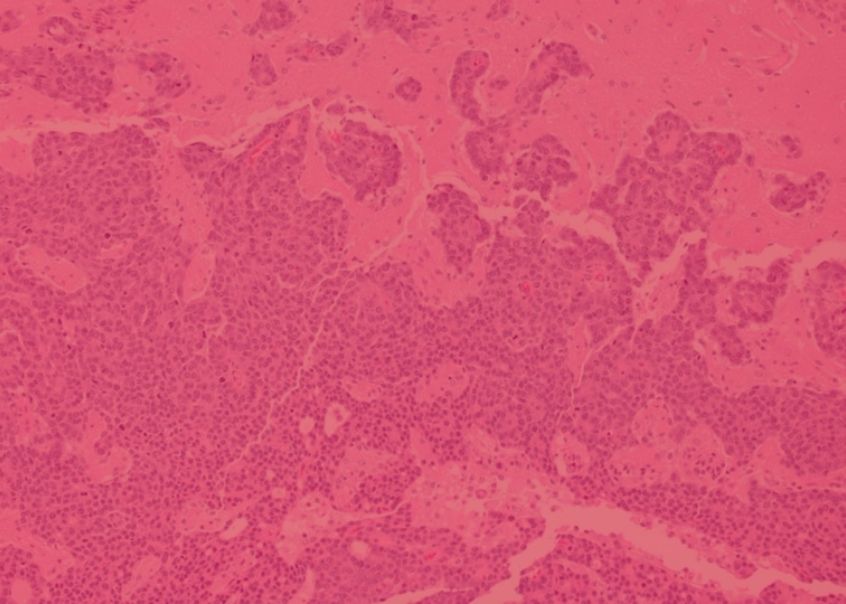
At a glance
The genomics era opened the door to a new understanding of cancer. We now have a full view of the landscape of genomic alterations in cancer cells and which of them are responsible for driving disease progression. The challenge lies in determining how this information can be used optimally to achieve better outcomes for cancer patients. Therapeutically targeting cancer drivers requires a detailed mechanistic understanding of how the genes that either cause (oncogenes) or prevent cancer (tumour suppressor genes) work at the molecular, cellular, and whole organism levels. Beyond these genomic alterations, cancer is also driven by changes that affect the biology of the genome without altering the DNA sequence. These include changes in the structure and regulation of chromatin (the assembly of DNA and proteins within the nucleus of the cell that packages long DNA molecules into dense chromosomes), DNA damage and repair processes, and changes in gene expression (the process of converting genetic information into a functional product). Many of the inherited mutations and gene variants that determine susceptibility to cancer also affect these processes, and a better fundamental understanding of these inherited factors will lead to improved diagnostic and treatment strategies for those at risk.
The GCI is home to some of the world's most accomplished investigators focused on the mechanistic study of cancer drivers and the fundamental biology of the cancer genome. They include trailblazers who discovered and dissected the structures and functions of oncogenes decades before cancer genome sequencing projects. Their findings and the methodologies they established reshaped their fields and led to therapies that have had a major clinical impact. We now use our advanced capabilities in cancer modeling as well as molecular, cellular, and “-omics” analysis to reveal the regulatory and functional mechanisms of the cancer genome. With partners, we use the fundamental knowledge acquired through this research to inform drug development programs and improve the alignment of patients with existing treatment strategies.
Areas of Focus
Team members
Our Discoveries
Researchers at the GCI made some of the earliest major discoveries on receptor tyrosine kinases (RTKs), a class of proteins implicated in many cancers. Activation of RTKs, typically by signals from the extracellular environment, controls powerful signaling pathways that instruct cells to grow and divide, move and invade local tissue, and survive in adverse conditions, among other things. Many RTKs are oncogenes, and some are important drug targets with clinically approved therapies that have dramatically improved outcomes in some cancer types. By discovering some of the major cancer-associated RTKs, establishing their oncogenic potential, and elucidating the molecular mechanisms by which they function, GCI researchers have been instrumental to these important advances.
Sequence of MET protooncogene cDNA has features characteristic of the tyrosine kinase family of growth-factor receptors. M Park, M Dean, K Kaul, MJ Braun, MA Gonda, G Vande Woude. Proceedings of the National Academy of Sciences 84 (18), 6379-6383, 1987
Mechanism of met oncogene activation. Park M, et al., Cell 45 (6), 895-904, 1986
Mutation of the c-Cbl TKB domain binding site on the Met receptor tyrosine kinase converts it into a transforming protein. Peschard P, et al., Molecular cell 8 (5), 995-1004, 2004
Single-step induction of mammary adenocarcinoma in transgenic mice bearing the activated c-neu oncogene. WJ Muller, E Sinn, PK Pattengale, R Wallace, P Leder. Cell 54 (1), 105-115, 1988.
Elevated expression of activated forms of Neu/ErbB-2 and ErbB-3 are involved in the induction of mammary tumors in transgenic mice: implications for human breast cancer. PM Siegel, ED Ryan, RD Cardiff, WJ Muller. The EMBO journal 18 (8), 2149-2164, 1999.
An ErbB2 splice variant lacking exon 16 drives lung carcinoma. HW Smith, L Yang, C Ling, A Walsh, VD Martinez, J Boucher, D Zuo, et al., Proceedings of the National Academy of Sciences 117 (33), 20139-20148, 2020.
Phosphatases are classes of enzymes that remove phosphate groups from specific amino acids within proteins. They are crucial regulators of signaling pathways that influence all aspects of cellular behaviour. Several important phosphatases that target the amino acid phosphotyrosine were discovered by GCI scientists, and their research has been instrumental in defining the roles of these important proteins in normal physiology and disease. These important functions include regulation of insulin sensitivity and other key aspects of metabolism, breast cancer progression, therapy response in gastric cancer, and immune cell behaviour.
Cloning and characterization of a mouse cDNA encoding a cytoplasmic protein-tyrosine-phosphatase. B Mosinger Jr, U Tillmann, H Westphal, ML Tremblay. Proceedings of the National Academy of Sciences 89 (2), 499-503, 1992
Increased insulin sensitivity and obesity resistance in mice lacking the protein tyrosine phosphatase-1B gene. M Elchebly, et al. Science 283 (5407), 1544-1548, 1999
Protein tyrosine phosphatase 1B deficiency or inhibition delays ErbB2-induced mammary tumorigenesis and protects from lung metastasis. SG Julien, et al., Nature genetics 39 (3), 338-346, 2007
Dynamic reprogramming of signaling upon met inhibition reveals a mechanism of drug resistance in gastric cancer. Lai AZ, et al., Sci Signal. 2014 Apr 22;7(322):ra38. doi: 10.1126/scisignal.2004839.PMID: 24757178.
Impaired bone marrow microenvironment and immune function in T cell protein tyrosine phosphatase-deficient mice. You-Ten KE, Muise ES, Itié A, Michaliszyn E, Wagner J, Jothy S, Lapp WS, Tremblay ML. J Exp Med. 1997 Aug 29;186(5):683-93. doi: 10.1084/jem.186.5.683. PMID: 9271584
Repairing DNA damage is essential for normal cells to prevent the mutations involved in cancer development. However, tumour cells can also develop dependencies on DNA repair pathways to avoid lethal genome damage caused by metabolic and environmental factors associated with cancer progression. The genes involved in DNA repair therefore play a very complex role in cancer, with some being prominent tumour suppressor genes and others also having oncogenic features. Investigators at the GCI have discovered the roles of key proteins in specific DNA repair pathways and their involvement in cancer progression. GCI scientists have also done important work on uncovering the vulnerabilities of cancer cells that are deficient in specific DNA repair pathways, including pancreatic cancers that have mutations in the well-known tumour suppressor genes BRCA1 and BRCA2.
CUX1 stimulates APE1 enzymatic activity and increases the resistance of glioblastoma cells to the mono-alkylating agent temozolomide. Kaur S, Ramdzan ZM, Guiot MC, Li L, Leduy L, Ramotar D, Sabri S, Abdulkarim B, Nepveu A. Neuro Oncol. 2018 Mar 27;20(4):484-493. doi: 10.1093/neuonc/nox178. PMID: 29036362
CUX1 transcription factor is required for optimal ATM/ATR-mediated responses to DNA damage. Vadnais C, Davoudi S, Afshin M, Harada R, Dudley R, Clermont PL, Drobetsky E, Nepveu A. Nucleic Acids Res. 2012 May;40(10):4483-95. doi: 10.1093/nar/gks041. Epub 2012 Feb 8. PMID: 22319212
RAS transformation requires CUX1-dependent repair of oxidative DNA damage.
Ramdzan ZM, Vadnais C, Pal R, Vandal G, Cadieux C, Leduy L, Davoudi S, Hulea L, Yao L, Karnezis AN, Paquet M, Dankort D, Nepveu A. PLoS Biol. 2014 Mar 11;12(3):e1001807. doi: 10.1371/journal.pbio.1001807. eCollection 2014 Mar. PMID: 24618719
A Preclinical Trial and Molecularly Annotated Patient Cohort Identify Predictive Biomarkers in Homologous Recombination-deficient Pancreatic Cancer. Wang Y, et al. Clin Cancer Res. 2020 Oct 15;26(20):5462-5476. doi: 10.1158/1078-0432.CCR-20-1439.
Nuclear receptors are the major transducers of signals from steroid hormones, as well as some vitamins and other chemical mediators. In response to hormone binding and other signals, they enter the cell nucleus and bind to chromatin, directly influencing the activation and repression of specific sets of genes. GCI investigators were among the first to discover members of this important class of proteins and the first to show that some of them, referred to as “orphan” nuclear receptors, do not bind to any hormones or other naturally occurring substances, presenting unique opportunities for drug development. Further important contributions by GCI scientists include the discovery of unexpected interacting partners of the androgen receptor (AR), which is the major driver of prostate cancer, and novel genetically engineered models of breast cancers with activating mutations in the estrogen receptor (ER) that were recently discovered in patients.
Identification of a receptor for the morphogen retinoic acid. V Giguere, ES Ong, P Segui, RM Evans. Nature 330, 624-629
Identification of a new class of steroid hormone receptors. V Giguère, NA Yang, P Segui, RM Evans. Nature 331 (6151), 91-94
ERRα mediates metabolic adaptations driving lapatinib resistance in breast cancer. Deblois G, Smith HW, Tam IS, Gravel SP, Caron M, Savage P, Labbé DP, Bégin LR, Tremblay ML, Park M, Bourque G, St-Pierre J, Muller WJ, Giguère V. Nat Commun. 2016 Jul 12;7:12156. doi: 10.1038/ncomms12156. PMID: 27402251
Nuclear mTOR acts as a transcriptional integrator of the androgen signaling pathway in prostate cancer. Audet-Walsh É, Dufour CR, Yee T, Zouanat FZ, Yan M, Kalloghlian G, Vernier M, Caron M, Bourque G, Scarlata E, Hamel L, Brimo F, Aprikian AG, Lapointe J, Chevalier S, Giguère V. Genes Dev. 2017 Jun 15;31(12):1228-1242. doi: 10.1101/gad.299958.117. Epub 2017 Jul 19. PMID: 28724614
Point-activated ESR1Y541S has a dramatic effect on the development of sexually dimorphic organs. Simond AM, Ling C, Moore MJ, Condotta SA, Richer MJ, Muller WJ. Genes Dev. 2020 Oct 1;34(19-20):1304-1309. doi: 10.1101/gad.339424.120. Epub 2020 Sep 1. PMID: 32912899
Up to 10% of all cancers are caused by inherited genetic changes. However, while some inherited mutations are strongly associated with specific cancer types, the full spectrum of inherited factors that can affect cancer development is unknown. Predicting an individual’s risk can therefore be very challenging, even when there is a family history of cancer. GCI scientists are leaders in identifying the genetic and epigenetic changes associated with hereditary forms of aggressive cancers. Through innovative genetic studies in model organisms and analysis of patient samples, they have identified genes that are associated with inherited risk of cancer and created new ways to study the biology of cancers associated with known susceptibility genes. With partners, GCI investigators also lead major initiatives linking the laboratory and the clinic to improve our understanding of genetic risk factors for cancer.
Deficient histone H3 propionylation by BRPF1-KAT6 complexes in neurodevelopmental disorders and cancer. Yan K, et al. Sci Adv. 2020 Jan 22;6(4):eaax0021. doi: 10.1126/sciadv.aax0021. eCollection 2020 Jan. PMID: 32010779
Smith AL, et al. Establishing a clinic-based pancreatic cancer and periampullary tumour research registry in Quebec. Curr Oncol. 2015 Apr;22(2):113-21. doi: 10.3747/co.22.2300. PMID: 25908910; PMCID: PMC4399608.
A region-based gene association study combined with a leave-one-out sensitivity analysis identifies SMG1 as a pancreatic cancer susceptibility gene. Wong C, et al. PLoS Genet. 2019 Aug 30;15(8):e1008344. doi: 10.1371/journal.pgen.1008344. PMID: 31469826
Characterization of a major colon cancer susceptibility locus (Ccs3) on mouse chromosome 3. Meunier C, et al. Oncogene volume 29, pages647–661 (2010).
Renal tumour suppressor function of the Birt-Hogg-Dubé syndrome gene product folliculin.
Hudon V, Sabourin S, Dydensborg AB, Kottis V, Ghazi A, Paquet M, Crosby K, Pomerleau V, Uetani N, Pause A. J Med Genet. 2010 Mar;47(3):182-9. doi: 10.1136/jmg.2009.072009. Epub 2009 Oct 19. PMID: 19843504
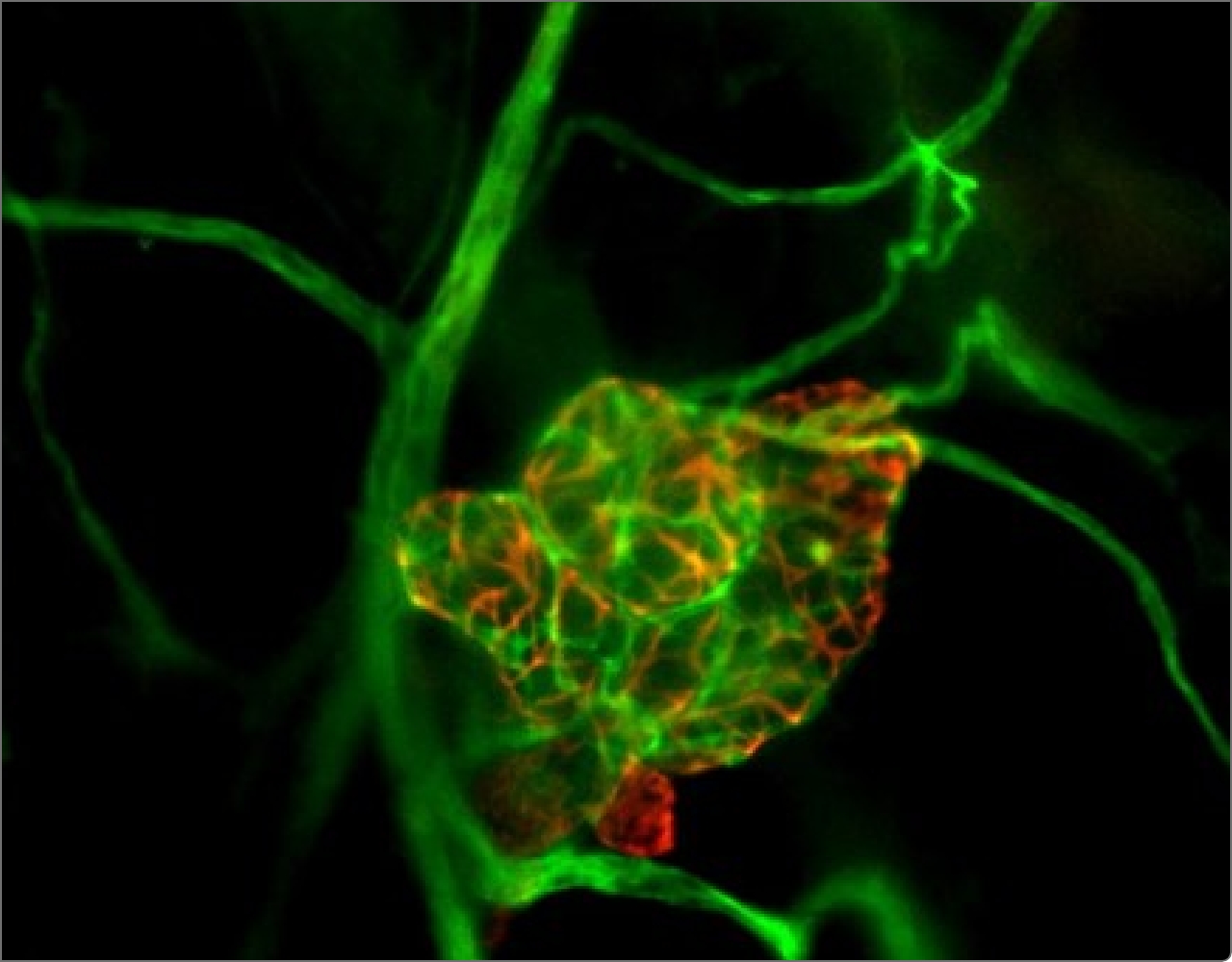
.jpg)
